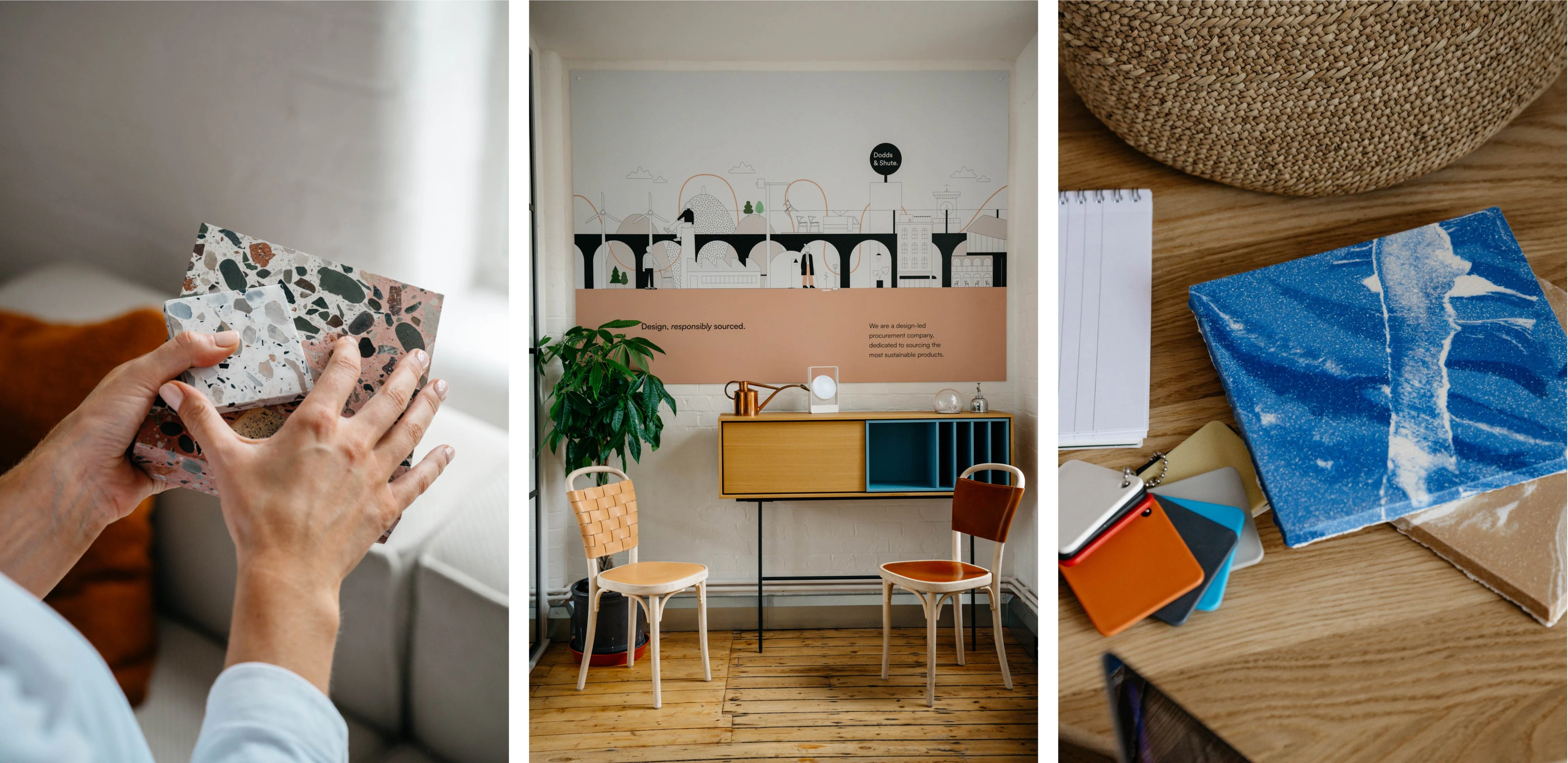
Changemakers: Dodds & Shute
14-Apr-2023
Dodds & Shute features sustainable samples in their London office.
Dodds & Shute: Sourcing the most sustainable furniture
Interview #2 in our Changemakers series
“We shifted our business model to become accountable for the things we sell.”
Dodds & Shute, based in London, is dedicated to sourcing the most sustainable furniture and lighting. We recently interviewed Lucy Arndt, head of sustainability, and Nick Shute, co-founder and creative director, to learn the behind-the-scenes thinking of this design-led procurement company. We asked about the intricacies of changing the game in the furniture world.
This is the second installment in mebl’s interview series, Changemakers, featuring sustainability and circularity leaders in the furniture industry, uncovering the nuts and bolts of how they’re driving change and why it matters.
 Lucy Arndt, Head of Sustainability; Nick Shute, Co-founder and Creative Director
Lucy Arndt, Head of Sustainability; Nick Shute, Co-founder and Creative Director
mebl: Tell us about Dodds & Shute!
 Lucy Arndt, Head of Sustainability; Nick Shute, Co-founder and Creative Director
Lucy Arndt, Head of Sustainability; Nick Shute, Co-founder and Creative DirectorLucy: We’re proud to be known as leaders in sustainability in the furniture design industry. We source furniture and furnishings, operating in the middle between clients, designers and manufacturers. Sometimes we work as a procurement partner, handling purchasing for clients who know exactly what they want. Other times, we’re employed to consult – and then we aim to only actively promote 100% sustainable furniture brands.
In the bigger picture, we're now trying to find the right clients and right partners to have more of an influence. We want to promote brands that are doing things in the right, sustainable way. In the last year, we started working with more corporates. Many have to hit hard-and-fast targets like net zero. It’s been a real door opener for us to grow and work with bigger players.
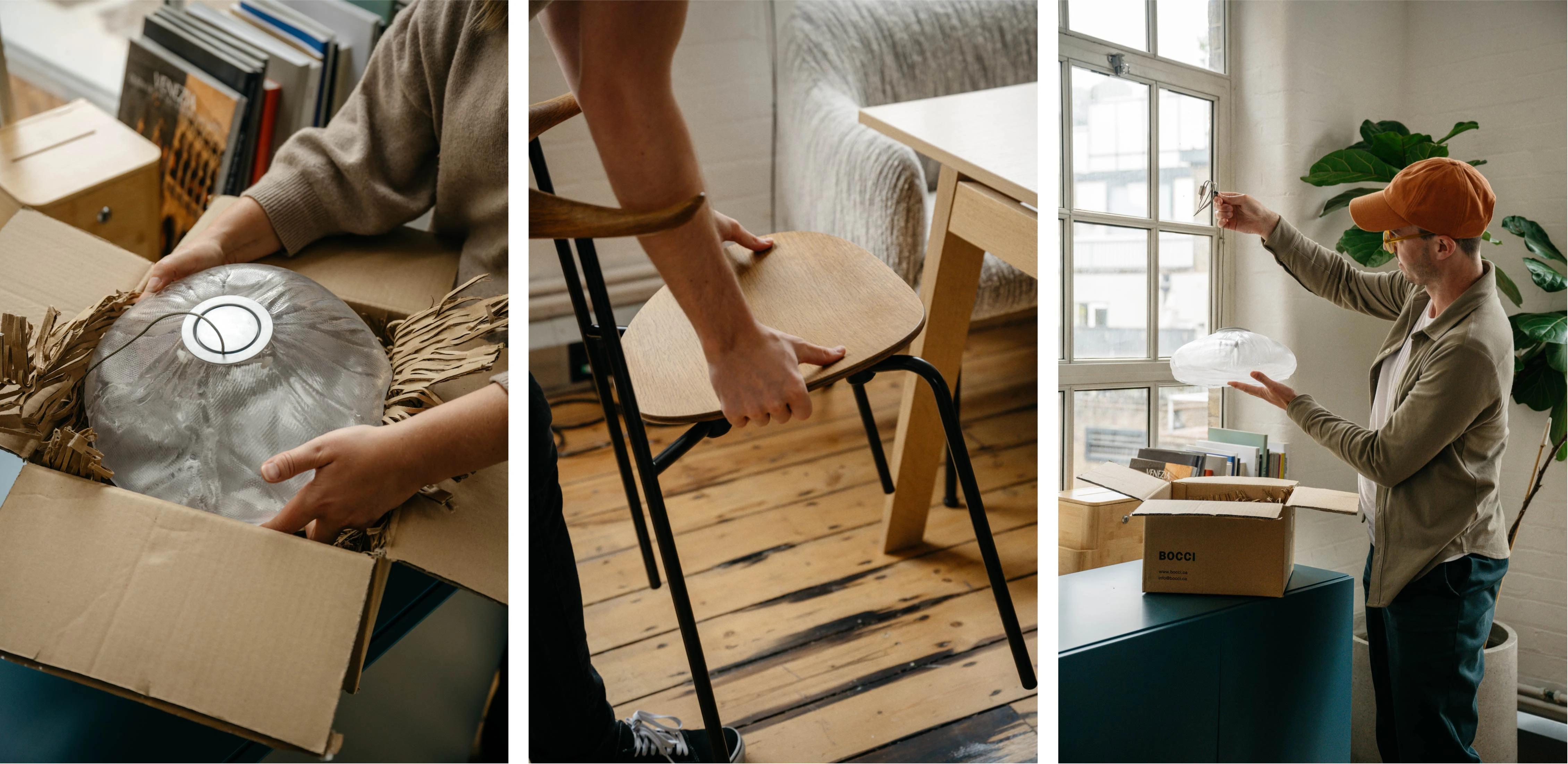 Unpacking furniture and lights from selected suppliers at the Dodds & Shute office in London
Unpacking furniture and lights from selected suppliers at the Dodds & Shute office in London
mebl: Did you focus on sustainability from day one?
Nick: No, sustainability wasn’t our strategy from the get-go. Several years ago, we began to feel a lot of guilt about our role in the industry. We were alarmed when the US pulled out of the Paris Climate Agreement. But simultaneously we saw a lot of American companies starting to hold themselves accountable for their carbon footprint. It’s something I had previously seen as the role of government and big business. We came to realize that we as individuals and small businesses can play a big role. We shifted our business model to become accountable for the things we sell – we transitioned from prioritizing aesthetics to equally prioritizing sustainability.
mebl: How can you make a business case for sustainability in furniture?
Nick: We’ve seen that businesses that take sustainability seriously are stronger and more future-proof. Here in the UK, we’ve all struggled through Brexit, COVID, the impacts of the war in Ukraine and a potential recession. Not everyone survived these difficult times. Our business case is proof of how a small business can be responsible, change many practices in a short amount of time, and still be profitable. These days I feel that we've got a really positive future on our hands.
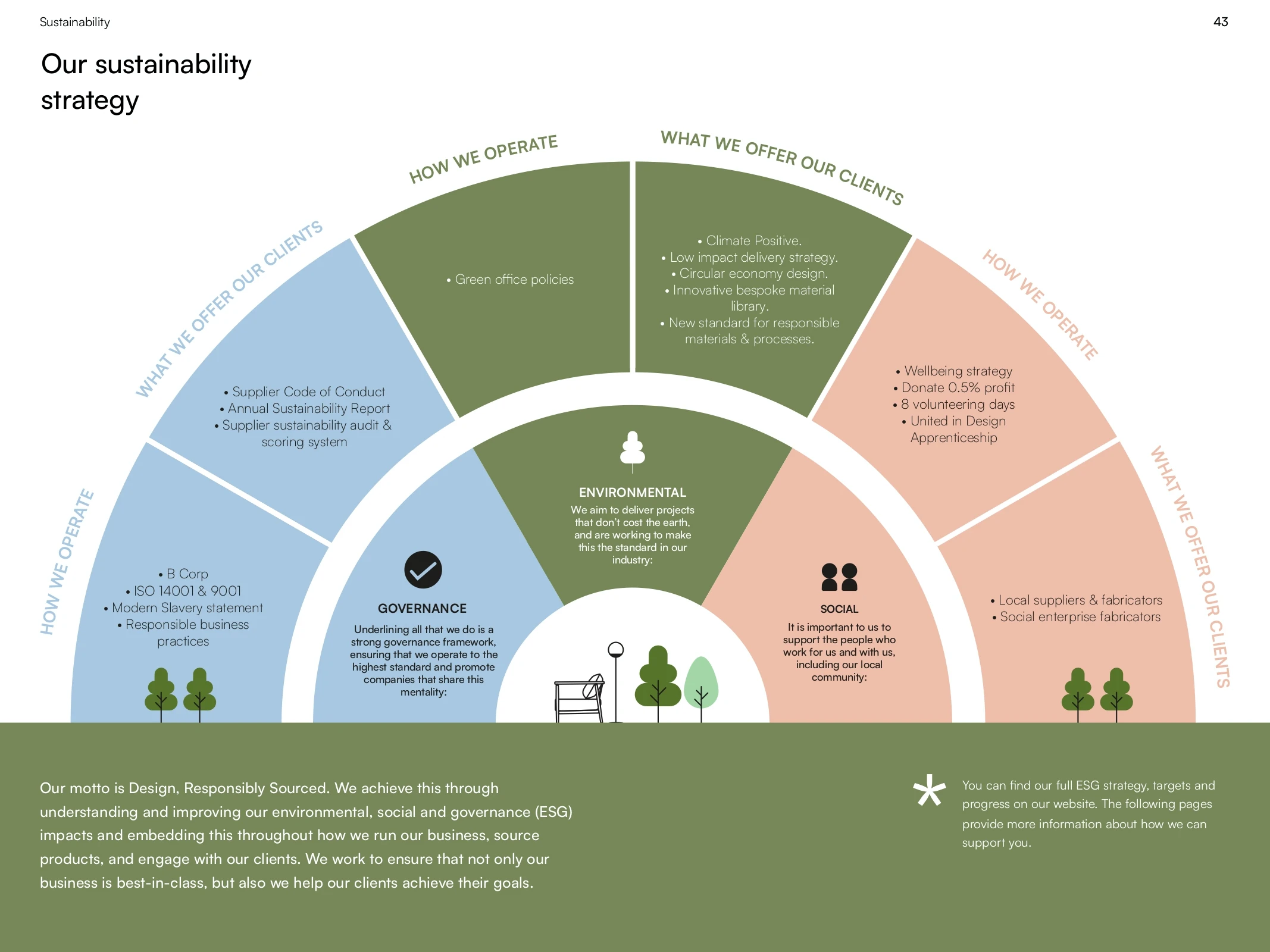 Dodds & Shute’s sustainability strategy including environmental, social and governance (ESG) impacts
Dodds & Shute’s sustainability strategy including environmental, social and governance (ESG) impacts
mebl: Do businesses have to become sustainable to survive?
Nick: In the last year or so, we’ve seen big businesses and corporates piggybacking on the conversation and driving serious business. Corporations start showing interest when they see an impact on their bottom line – when they start, for example, to lose sales, be taken off tenders, and/or removed from specifications because they can't hit sustainability requirements. Suddenly they may be losing thousands (or millions) of pounds of business as other corporates begin coming to the table with an agenda. Money talks. It's really nice to see businesses doing things the right way get rewarded for having sustainability practices in place.
mebl: What does your focus on sustainability look like?
Lucy: Our 2030 target is to have 90% of all the furniture we sell come from our audited and classified sustainable brands. That’s our real journey - finding brands that meet our criteria, supporting our existing suppliers, and giving our clients the information they need to help them make the right decisions.
mebl: Does sustainability at Dodds & Shute come at a premium?
Nick: It doesn’t have to. Brands on the market that we know and trust are doing things efficiently, economically, and sustainably. We recognize that pieces made by hand come with a higher price tag, but we also have a large catalog of sustainable furnishings that are affordable.
Lucy: Like anything, sustainability is about compromise. At times we’ve had to make different aesthetic decisions and compromise on a finish or fabric we wanted. We’ve also had to change suppliers to hit the same price point and be sustainable. It’s not as easy as saying ‘Let’s make this sustainable’ - there has to be an ongoing evaluation and review process.
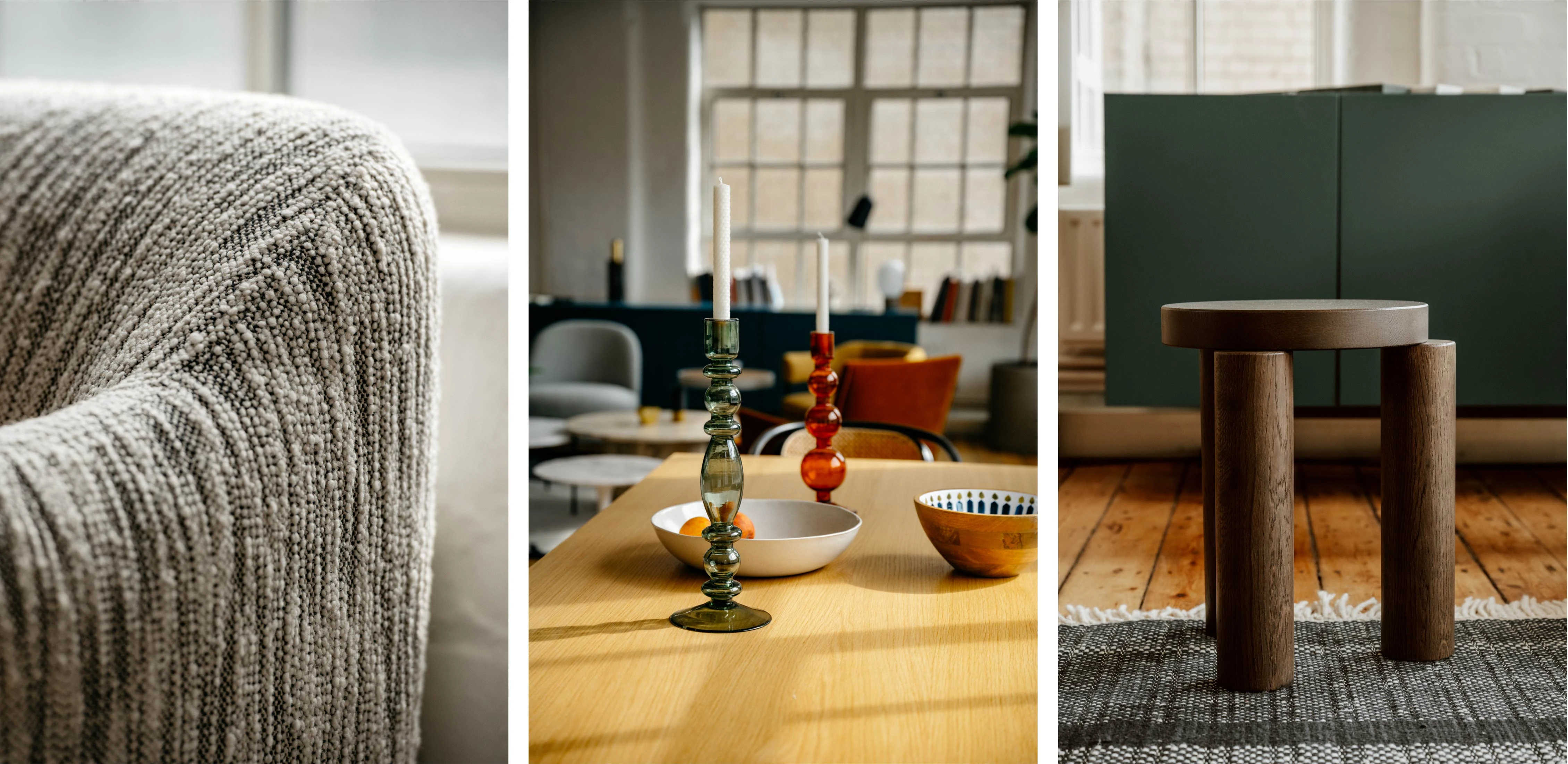 Sustainable sofa, tableware, and stools are part of the Dodds & Shute product catalog
Sustainable sofa, tableware, and stools are part of the Dodds & Shute product catalog
mebl: We’d love to hear about your sustainability audit.
Nick: We started conducting audits to evaluate the practices of our suppliers - how and where they manufacture, what sort of materials they use, how they innovate, and how they look after their people, internal governance, and other factors. Suppliers begin by completing a questionnaire, in which they outline their practices and commitments.
Initially, we used the audit for internal purposes – until one of our suppliers saw the data and encouraged us to release it. When that became public, it reached the attention of journalists at Forbes Magazine and Dezeen. In a meeting with Marcus Fairs, the visionary founder and editor-in-chief of Dezeen, he exclaimed that this information is crucial to changing the industry and that it shouldn’t come from the designer, client, or manufacturer, but from a business like us - in the commercial design industry.
mebl: Tell us more about your ranking system.
Lucy: We got to a point where we needed a way to compare ‘apples’ to ‘apples.’ Creating the audit and the ranking system was our attempt at measuring and sorting our suppliers in order to feel confident in our recommendations. Products that score between 70-79% earn a leaf icon; products that score 80-89% get a branch; and products with 90-100% get a tree icon. That helps tell a visual, aesthetic story and gets people to think about what they're buying.
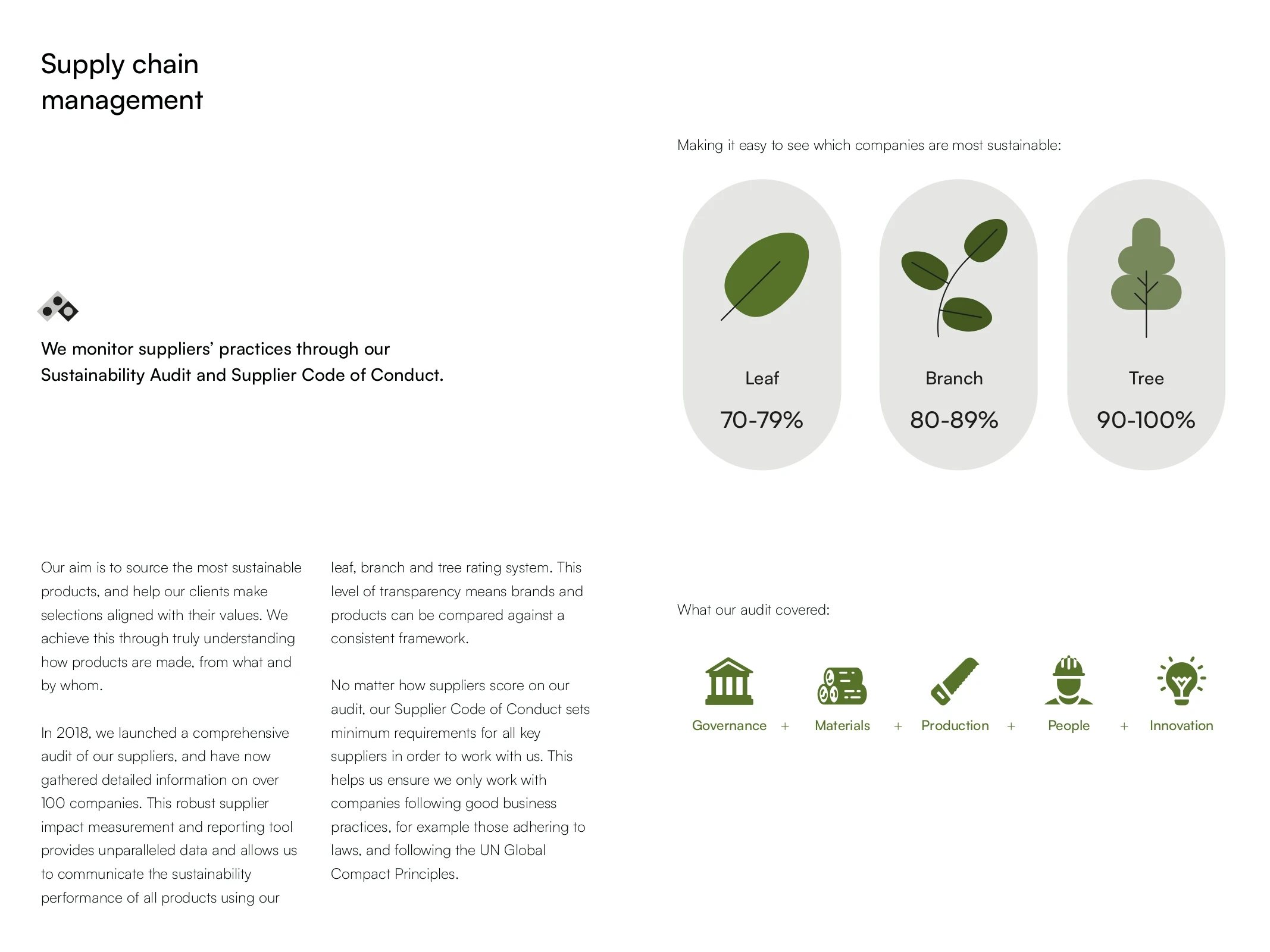 Dodds & Shute sustainability audit and rating system
Dodds & Shute sustainability audit and rating system
mebl: Are your suppliers benefiting from the audit and rating system?
Lucy: Yes, we’ve seen a lot of companies use the questionnaire as a guide. For example, when we launched our audit several years ago, some suppliers didn’t quite succeed at achieving a sustainable ranking. When that happened, we didn’t just “drop” the companies, we instead continued to advise them on using the audit as a best practice guide and as a tool to keep track of their progress. We’ve also seen brands include their ranking in their sustainability reports. It helps them with credibility and in telling their story.
mebl: How else do you help suppliers tell their story?
Lucy: We help designers and brands by promoting them on our website. We pull and expand upon information from our audit questionnaires and product pages to offer more detail about specific products. Our own sustainability report features brands doing things in a really innovative or different way.
Nick: The story is everything. Our industry is guilty of only judging two things - price point and aesthetics. We’ve tried to introduce the celebration of the unseen. The story, the goodness, and the provenance are usually impossible for people to understand as they’re not visible. Consequently, it depends on how we tell the story after the delivery and celebrate the underlying decisions.
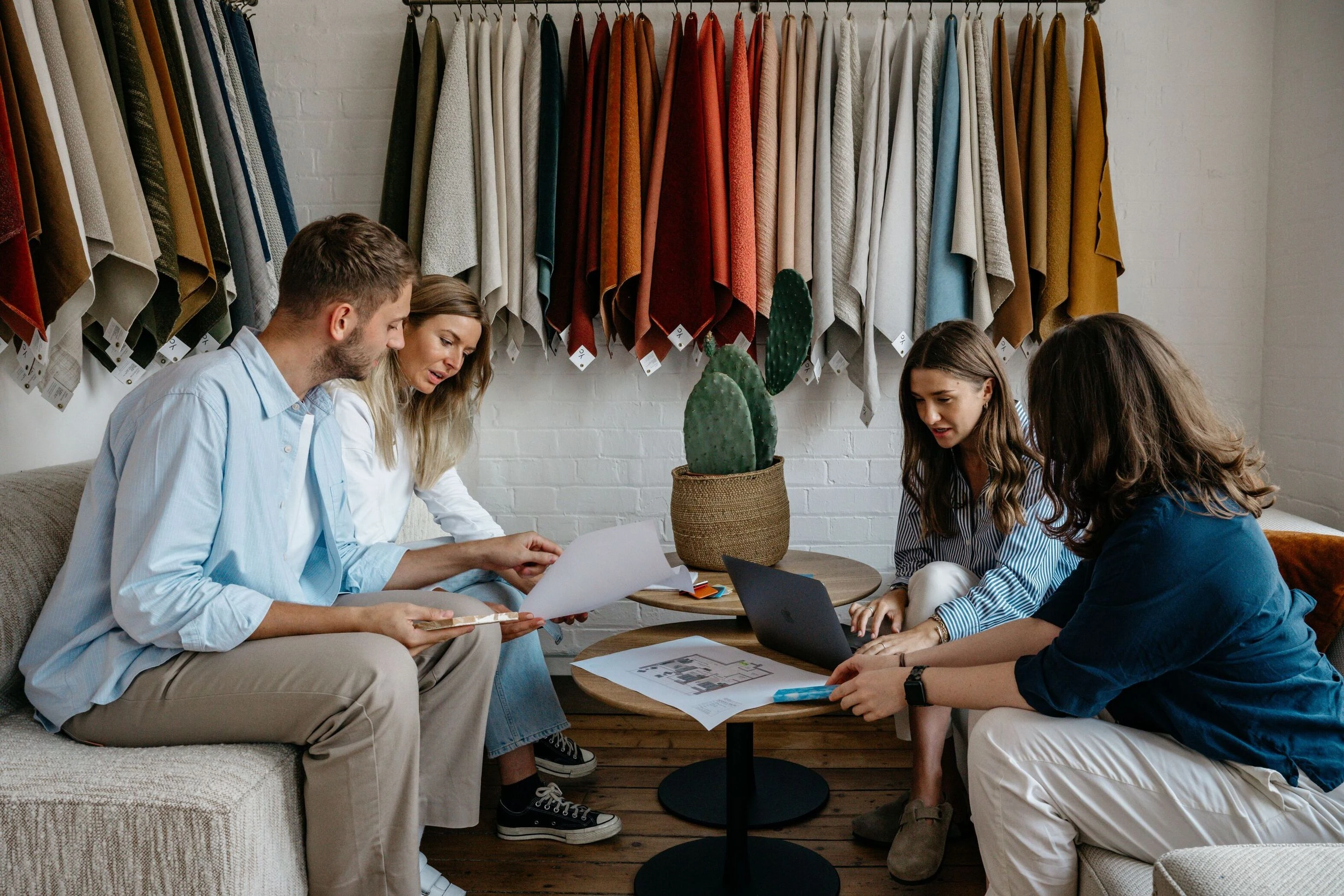 Selecting products and materials
Selecting products and materials
mebl: What has been your biggest unexpected challenge?
Nick: We made our transition – flipping our supplier model – at quite a challenging time. We had to rely on our commercial relationships to see us through. The new mentality wasn't an overnight shift. We had to motivate the shift, educating our suppliers on why sustainability is best practice. We also had to explain to our purchasing clients that sometimes sustainability is about sacrifice. The biggest challenge has been convincing clients to compromise on what they define as necessities!
mebl: How does raising awareness facilitate this transition?
Lucy: We spend a significant amount of time on many kinds of outreach. Whether through informal chats with suppliers, university talks, doing Continuing Professional Development (CPD) or training sessions for various suppliers and clients, or interviews like these to get the word out. It’s important to us. Not only to get our name out but because we think it's essential for anything to change, we need these conversations - more knowledge sharing, broader collaboration.
Nick: We’re trying to make it easier for designers by becoming a resource, library or contact point. At the same time, we want to make it painstakingly clear that we are not the experts. We are learning from the suppliers. They're the ones implementing the innovations, going the extra mile, putting all these things in place – and we just collect the data!
mebl: A final, cheeky question: Name one thing in your personal life that is getting a circular, sustainable or climate-positive rethink.
Lucy: I’m having a baby! And, as you know, first-time parents are often like a marketer's dream, combining a level of disposable income with absolutely zero knowledge of what you're doing … coupled with this guilt about doing the “right” thing!
I’ve been really conscious about what I buy and whether it needs to be new. It’s been a personal challenge for me to get everything second-hand – there are so many great second-hand websites now like eBay! So I’m trying to rein in my consumption and be responsible with how I spend. I see it as my personal way of celebrating the as-yet-unseen!
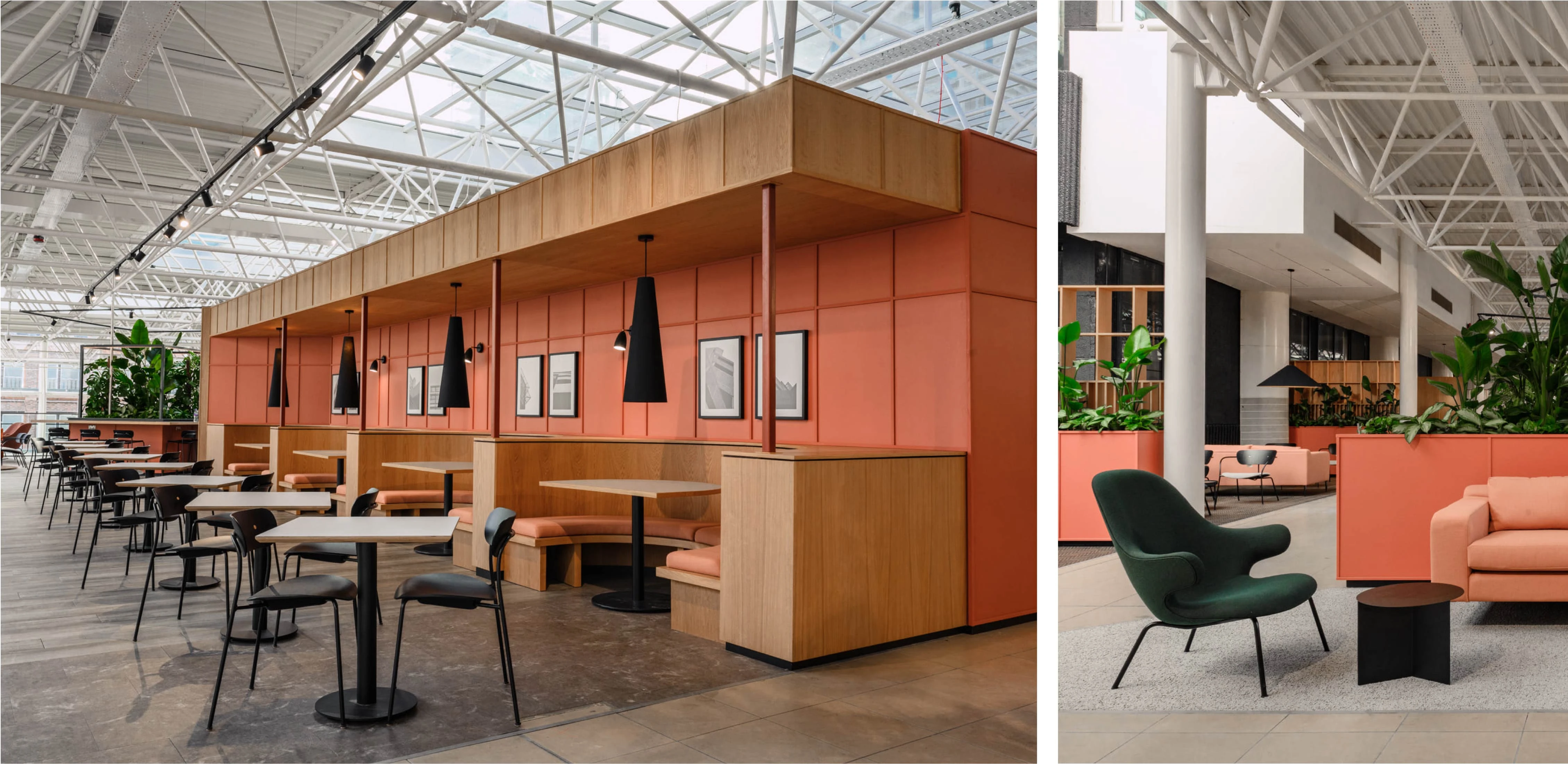 Furniture, fittings and equipment provided by Dodds & Shute in The Capital, Liverpool’s largest office building.
Furniture, fittings and equipment provided by Dodds & Shute in The Capital, Liverpool’s largest office building.
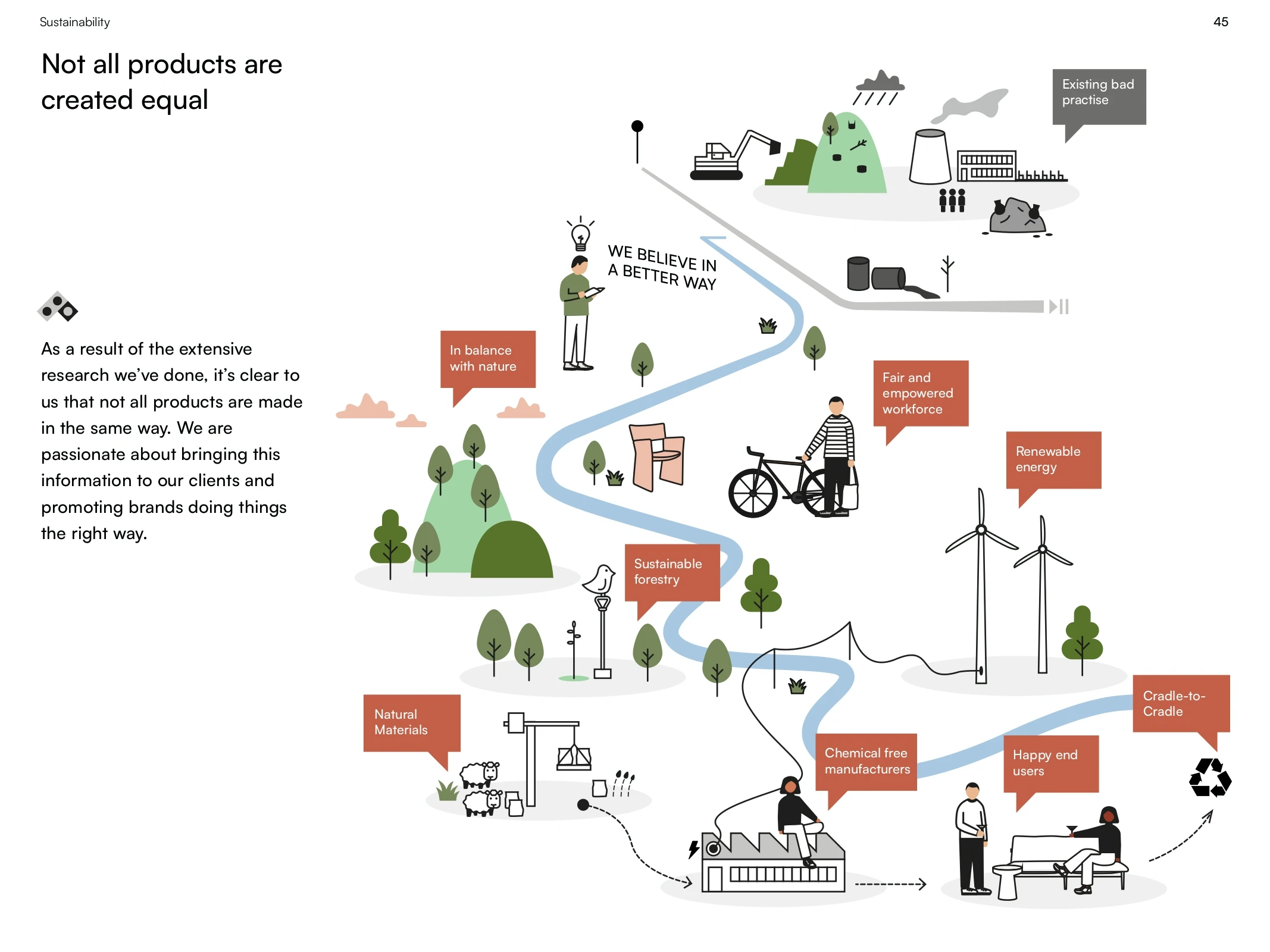 Dodds & Shute’s sustainable value chain
Dodds & Shute’s sustainable value chain
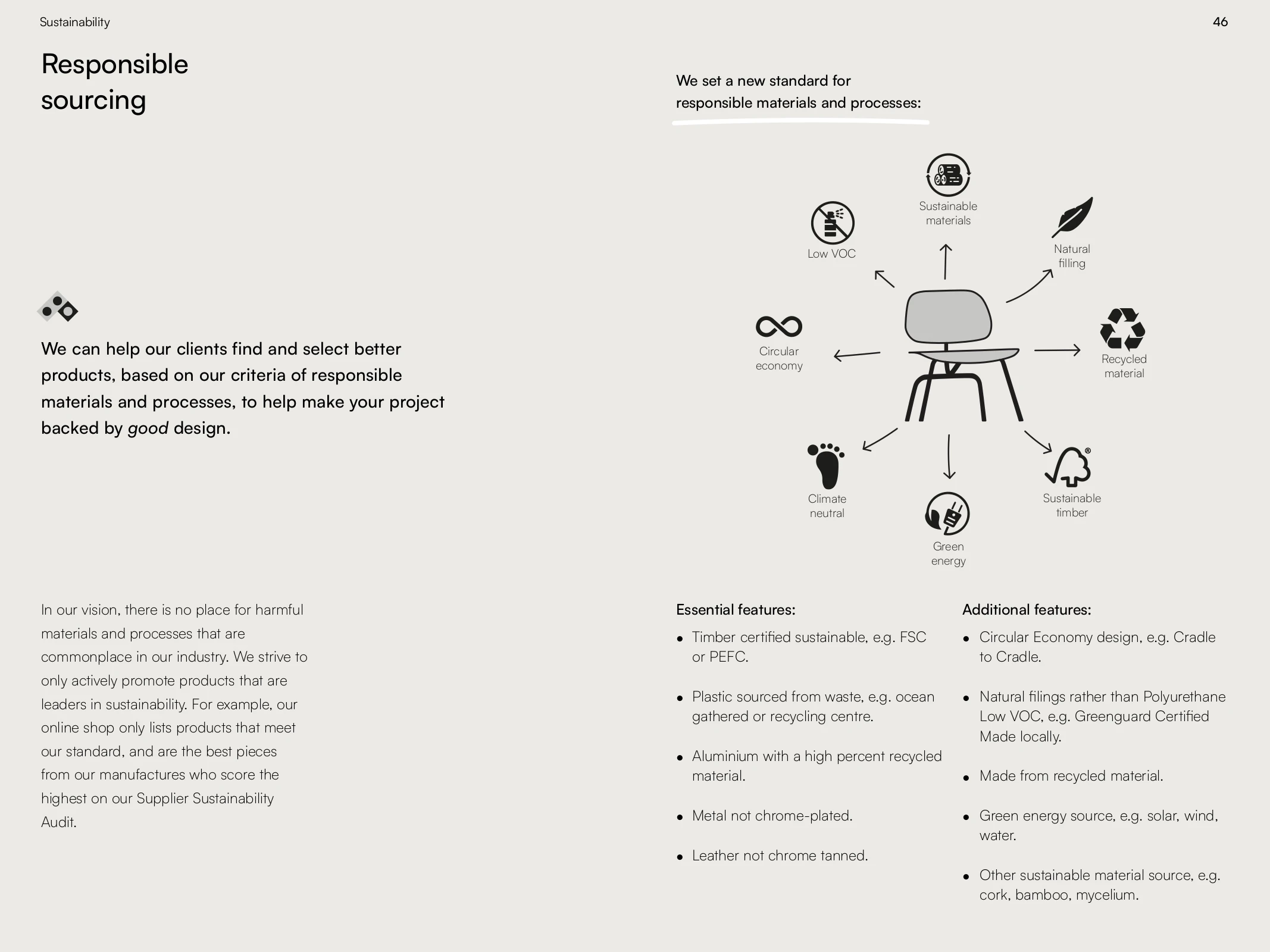 Responsible sourcing of materials and processes
Responsible sourcing of materials and processes
Photo credits: Amy Heycock
READ more Changemaker Interviews here.
 Unpacking furniture and lights from selected suppliers at the Dodds & Shute office in London
Unpacking furniture and lights from selected suppliers at the Dodds & Shute office in London Dodds & Shute’s sustainability strategy including environmental, social and governance (ESG) impacts
Dodds & Shute’s sustainability strategy including environmental, social and governance (ESG) impacts Sustainable sofa, tableware, and stools are part of the Dodds & Shute product catalog
Sustainable sofa, tableware, and stools are part of the Dodds & Shute product catalog  Dodds & Shute sustainability audit and rating system
Dodds & Shute sustainability audit and rating system Selecting products and materials
Selecting products and materials  Furniture, fittings and equipment provided by Dodds & Shute in The Capital, Liverpool’s largest office building.
Furniture, fittings and equipment provided by Dodds & Shute in The Capital, Liverpool’s largest office building.  Dodds & Shute’s sustainable value chain
Dodds & Shute’s sustainable value chain Responsible sourcing of materials and processes
Responsible sourcing of materials and processesPhoto credits: Amy Heycock
